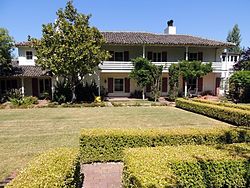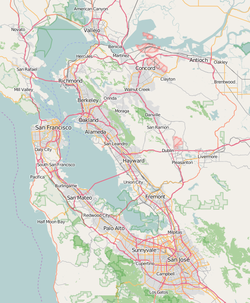Eugene O'Neill National Historic Site
Tao House | |
 Tao House in summer | |
| Location | Kuss Road, Danville, California |
|---|---|
| Coordinates | 37°49′28″N 122°1′47″W / 37.82444°N 122.02972°W |
| Area | 158.6 acres (64.2 ha) |
| Built | 1937 |
| Architect | Frederick Confer |
| Architectural style | Monterey Colonial |
| Visitation | 3,652 (2005) |
| Website | Eugene O'Neill National Historic Site |
| NRHP reference No. | 71000137[1] |
| Significant dates | |
| Added to NRHP | May 6, 1971[1] |
| Designated NHL | July 17, 1971[2] |
| Designated NHS | October 12, 1976 |
The Eugene O'Neill National Historic Site, located in Danville, California, preserves Tao House, the Monterey Colonial hillside home of America's only Nobel Prize-winning playwright, Eugene O'Neill.
History of Tao House
Eugene O'Neill had won the Nobel Prize for Literature in 1936, and used the prize money to build what he named Tao House above Danville.[3] O'Neill and his wife lived in the home from 1937 to 1944.[4] By the time he moved here, O'Neill had already lived in over 35 places, but he called this secluded house his "final home and harbor".[5] At this home, O'Neill wrote his final plays: The Iceman Cometh, Long Day's Journey Into Night, Hughie, and A Moon for the Misbegotten.[3] Due to a degenerative condition in his hand, he was unable to complete another play after 1943.[6]

O'Neill and his wife, actress Carlotta Monterey, showed their interest in Asian art, decor, and thought in preparing the home.[3] The two personally designed the two-story, three-bedroom home from the ground up.[5] The ceilings were dark blue to mimic the sky with dark wood floors representing the earth, as well as Noh masks, Chinese guardian statues, and Chinese lacquerware furnishings throughout the interior.[7] Outside, Carlotta installed a garden in a zigzag pattern which Chinese tradition indicated would keep away evil spirits.[8] They also planted several trees, including pine, almond, and redwood.[7] The O'Neills moved to Boston after World War II.[9]
The house was saved from demolition in the early 1970s. Several women formed the Eugene O’Neill Foundation, including president Darlene Blair and executive vice president Lois Sizoo, in order to raise money to buy Tao House, which had been named a National Landmark in 1971.[10] They did so through several fundraising projects, including benefit performances of Eugene O’Neill's play Hughie featuring Jason Robards. Through their efforts, Tao House was declared a National Historic Landmark in 1971,[2] a National Historic Site in 1976, and passed into the management of the National Park Service in 1980. The Foundation has produced an annual festival of O'Neill's works since 1999, including performances on site.[11]
Legislative history
Congressman George Miller and Senator Alan Cranston introduced companion bills to have Tao House recognized as a National Historic Site in 1975. AB 4539 was signed into law in Sacramento in September 1976, making the site California State property. George Miller's HR 9126 passed in Congress and, on October 19, 1976, President Gerald Ford signed SB 2398 into law. Tao House and the property were designated a National Historic Site.[12] Finally, on June 12 of 1980, ownership of Eugene O'Neill NHS officially transferred to the federal government, making it exactly under the NPS.
The establishment of Eugene O’Neill National Historic Site is justified by two reasons. First, the site is needed to commemorate Eugene O’Neill, one of the greatest writers in American literature. Eugene O’Neill lived in Tao House from 1937 to 1944, and wrote his most brilliant playwrights. Preserving Tao House will provide public memorial of the works of Eugene O’Neill and his life. Second, the site will serve education and opportunity of performing arts to public. Providing proper cultural sources to society is one of the important missions of National Park Service.[13]
Administrative history
Past superintendents
| Term | Name | Related National Parks | Note |
|---|---|---|---|
| 10/18/1976 ~ 03/06/1989 | Phyllis Shaw | John Muir NHS | |
| 1989 ~ 1992 | Craig W. Dorman | ||
| 1993 ~ 2004 | Glenn Fuller | John Muir NHS & Port Chicago Naval Magazine NM | |
| September, 2005 ~ September, 2010 | Martha J. Lee | John Muir NHS & Port Chicago Naval Magazine NM & Rosie the Riveter-World War II Home Front NHP | |
| December, 2010 ~ October, 2021 | Tom Leatherman | John Muir NHS & Port Chicago Naval Magazine NM & Rosie the Riveter-World War II Home Front NHP | |
| October, 2021 ~ April, 2022 | Naomi Torres | John Muir NHS & Port Chicago Naval Magazine NM & Rosie the Riveter-World War II Home Front NHP | Acting Superintendent |
| April, 2022 ~ | K. Lynn Berry | John Muir NHS & Port Chicago Naval Magazine NM & Rosie the Riveter-World War II Home Front NHP |
Current situation
| Year | Differed Maintenance |
|---|---|
| 2014 | $88,367 |
| 2015 | $1,323,688 |
| 2016 | $1,298,269 |
| 2017 | $1,355,781 |
| 2018 | $930,705 |
| FY 2018 | $129m |
Eugene O'Neill Foundation is looking for subscribers.
Archive
The Foundation maintains an archive of Eugene O'Neill-related material at Tao House (including photographs, playbills, manuscripts, posters, and O'Neill's original phonograph record collection) and sponsors events such as productions of O'Neill plays, staged in the adjacent barn.
Visiting the house
The National Park Service does not publish the address of the property, but it is widely known that it is located near Kuss Road in Danville. A locked gate prevents unauthorized vehicles from reaching the site. The Site occupies 13 acres (5.3 ha) accessible via car only by private road, so advance reservations are required to visit. Private vehicles are not allowed. Transportation to the site is provided by a twice-daily free shuttle from Danville at 10am and noon on Wednesdays to Sundays and also at 2pm on Saturdays. Reservations are required except on Saturdays when tours are self-guided.[14]
Trails from Las Trampas Regional Wilderness also lead to the site. Reservations are also recommended for those arriving for a tour via horseback or on foot.
See also
References
- ^ a b "National Register Information System". National Register of Historic Places. National Park Service. July 9, 2010.
- ^ a b "Tao House". National Historic Landmarks Quioklinks. National Park Service. Archived from the original on October 9, 2012. Retrieved March 19, 2012.
- ^ a b c McKinney, John. California's National Parks: A Day Hiker's Guide. Berkeley, CA: Wilderness Press, 2005: 135. ISBN 0-89997-387-6
- ^ Camble, Robert S. (March 23, 1973). "Eugene O'Neill House" (pdf). National Register of Historic Places - Inventory Nomination Form. National Park Service. Retrieved May 18, 2012.
- ^ a b Schmidt, Shannon McKenna and Joni Rendon. Novel Destinations: Literary Landmarks from Jane Austen's Bath to Ernest Heminway's Key West. Washington, D.C.: National Geographic, 2008: 13. ISBN 978-1-4262-0277-3
- ^ McKinney, John. California's National Parks: A Day Hiker's Guide. Berkeley, CA: Wilderness Press, 2005: 136–137. ISBN 0-89997-387-6
- ^ a b Boeck, Raynell. Peaceful Places San Francisco: 110 Tranquil Sites in the City and the Greater Bay Area. Menasha Ridge Press, 2010: 61. ISBN 978-0-89732-718-3
- ^ McKinney, John. California's National Parks: A Day Hiker's Guide. Berkeley, CA: Wilderness Press, 2005: 135–136. ISBN 0-89997-387-6
- ^ McKinney, John. California's National Parks: A Day Hiker's Guide. Berkeley, CA: Wilderness Press, 2005: 137. ISBN 0-89997-387-6
- ^ Kaufman, Polly Welts. National Parks and the Woman's Voice: A History. The University of Mexico Press, 2006: 215. ISBN 978-0-8263-3994-2
- ^ "20th Annual Eugene O'Neill Festival". eugeneoneill.org. Retrieved December 3, 2019.
- ^ Lane, Beverly (August 10, 2016). "A Short History of Tao House and East Bay Regional Park".
- ^ "Redirecting..." heinonline.org. Retrieved May 3, 2022.
{cite web}: Cite uses generic title (help) - ^ Reservation page for Tao House
External links
- Eugene O'Neill National Historic Site, NPS website
- Eugene O'Neill Foundation
- "Eugene O'Neill House" (pdf). Photographs. National Park Service. Retrieved May 18, 2012.




